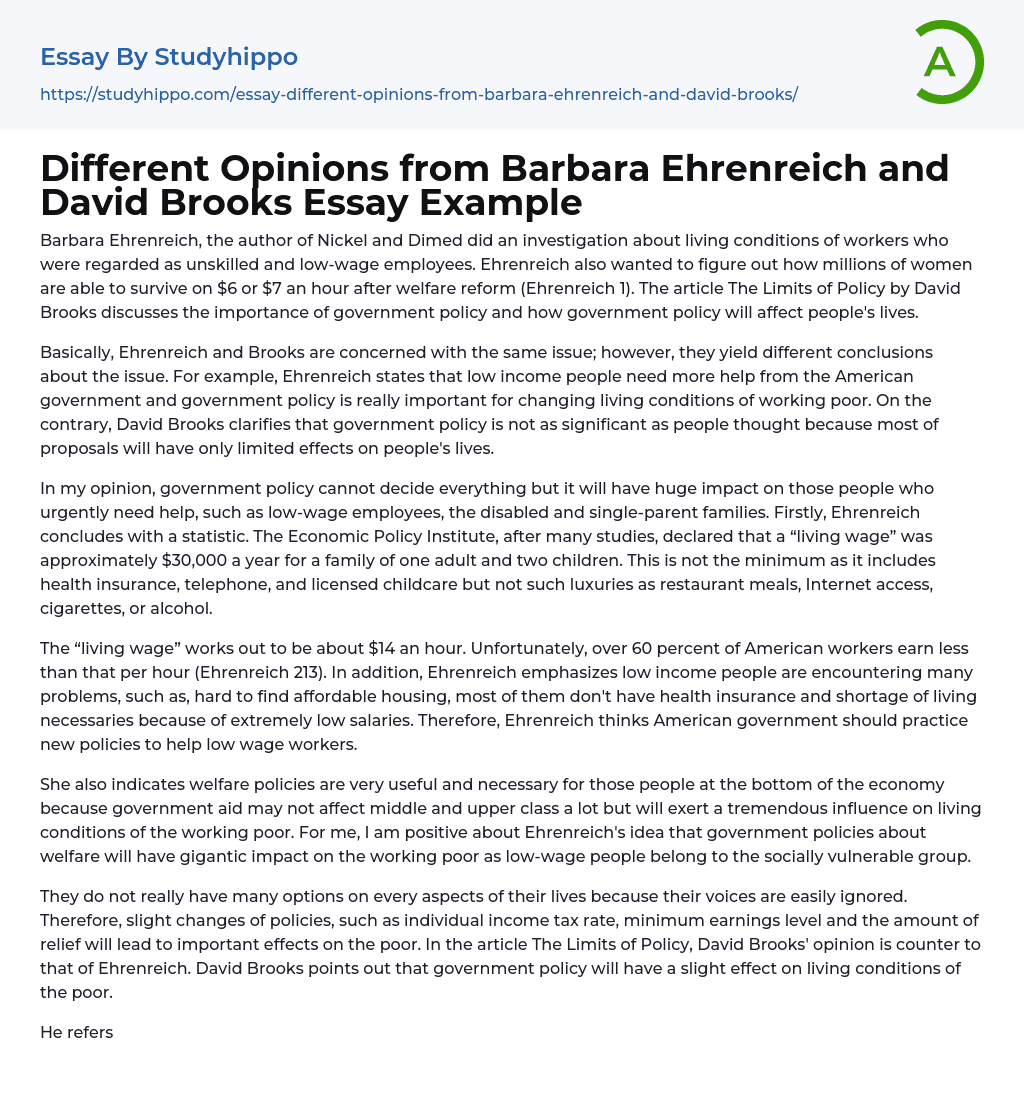

Different Opinions from Barbara Ehrenreich and David Brooks Essay Example
Barbara Ehrenreich, the author of Nickel and Dimed did an investigation about living conditions of workers who were regarded as unskilled and low-wage employees. Ehrenreich also wanted to figure out how millions of women are able to survive on $6 or $7 an hour after welfare reform (Ehrenreich 1). The article The Limits of Policy by David Brooks discusses the importance of government policy and how government policy will affect people's lives.
Basically, Ehrenreich and Brooks are concerned with the same issue; however, they yield different conclusions about the issue. For example, Ehrenreich states that low income people need more help from the American government and government policy is really important for changing living conditions of working poor. On the contrary, David Brooks clarifies that government policy is not as significant as people thought because most of proposals will have onl
...y limited effects on people's lives.
In my opinion, government policy cannot decide everything but it will have huge impact on those people who urgently need help, such as low-wage employees, the disabled and single-parent families. Firstly, Ehrenreich concludes with a statistic. The Economic Policy Institute, after many studies, declared that a “living wage” was approximately $30,000 a year for a family of one adult and two children. This is not the minimum as it includes health insurance, telephone, and licensed childcare but not such luxuries as restaurant meals, Internet access, cigarettes, or alcohol.
The “living wage” works out to be about $14 an hour. Unfortunately, over 60 percent of American workers earn less than that per hour (Ehrenreich 213). In addition, Ehrenreich emphasizes low income people are encountering many problems, such as, hard to find affordable housing,
most of them don't have health insurance and shortage of living necessaries because of extremely low salaries. Therefore, Ehrenreich thinks American government should practice new policies to help low wage workers.
She also indicates welfare policies are very useful and necessary for those people at the bottom of the economy because government aid may not affect middle and upper class a lot but will exert a tremendous influence on living conditions of the working poor. For me, I am positive about Ehrenreich's idea that government policies about welfare will have gigantic impact on the working poor as low-wage people belong to the socially vulnerable group.
They do not really have many options on every aspects of their lives because their voices are easily ignored. Therefore, slight changes of policies, such as individual income tax rate, minimum earnings level and the amount of relief will lead to important effects on the poor. In the article The Limits of Policy, David Brooks' opinion is counter to that of Ehrenreich. David Brooks points out that government policy will have a slight effect on living conditions of the poor.
He refers a book named "What Money Can’t Buy" wrote by Susan E. Mayer of the University of Chicago to prove his argument. "what would happen if you could double the income of the poorest Americans. The results would be disappointingly small. Doubling parental income would barely reduce dropout rates of the children. It would have a small effect on reducing teen pregnancy. It would barely improve child outcomes overall"(Brooks, par. 13). As a result, Brooks holds the opinion that even if American government tries to raise wages of the poor, the outcome will
not be a great change.
For my part, I partly agree with Brooks that even if American government doubles the income of the poor, it would barely reduce dropout rates of the children and teen pregnancy. However, at least it would improve those families' living conditions because people would have more money to buy life's necessities and promote diet quality. If I am the poorest American and the government doubles my income, I think it would not change my mind about the big issue like should I send my kids to college, but I would definitely buy my kids less hot dogs as their dinner.
All in all, I totally agree with Ehrenreich's opinion and partly agree with Brooks' opinion on the issue about whether the government policies will have a huge influence on the poor or not. Ehrenreich and Brooks hold different opinions about policy impact on the poor. I believe that Ehrenreich's argument is more accurate than Brook's because government policies will change people's lives a lot, especially for the working poor. Brooks' idea has its limitation because he only focuses on the variations of major events about people's lives, but not the daily details.
- Overpopulation essays
- Homelessness essays
- Hunger essays
- Dumpster Diving essays
- Homelessness In America essays
- 12 Angry Men essays
- A beautiful mind essays
- A Separation essays
- Alfred Hitchcock essays
- American Beauty essays
- American Films essays
- Animation essays
- Avatar essays
- Blade Runner essays
- Bollywood essays
- Bond essays
- Bridge essays
- Cinema Of The United States essays
- Comedies essays
- David essays
- Dead Poets Society essays
- Do The Right Thing essays
- Documentary essays
- English-Language Films essays
- Erin Brockovich essays
- Film Analysis essays
- Film Editing essays
- Film Noir essays
- Film Techniques essays
- Finding Forrester essays
- Forrest Gump essays
- Gattaca essays
- Gladiator essays
- Glory essays
- Good Will Hunting essays
- Hamilton essays
- Hollywood essays
- Horror essays
- Jaws essays
- King kong essays
- Like Water For Chocolate essays
- Looking For Alibrandi essays
- Martin Scorsese essays
- Melodrama essays
- Monster essays
- Moulin rouge essays
- Movie Analysis essays
- Movie Review essays
- On The Waterfront essays
- One Flew Over The Cuckoo'S Nest essays



